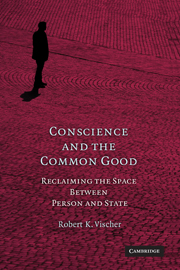4 - Conscience and the Common Good
Published online by Cambridge University Press: 05 June 2012
Summary
Conscience's orientation toward action contributes to its relational nature by drawing the believer beyond the boundaries of her mind and into her social environment. When Daniel Seeger sought an exemption from military service based on his conscientious opposition to war, he defied any effort to equate conscience with belief. If the government had responded to his claim by assuring him that the United States would never coerce him to abandon his belief that war is immoral, the gesture would have been properly ridiculed as absurd. Defining freedom of conscience as freedom of belief avoids the tough questions (how often does the state attempt to compel belief today?), but it eviscerates the power of conscience, which is more properly understood as moral belief applied to conduct.
This understanding of conscience, however, does not always prevail. Both houses of the British Parliament recently issued a report analyzing new regulations prohibiting discrimination against gays and lesbians in the provision of public services. The report addressed whether the prohibition was problematic as applied to religious providers, particularly as applied to religious schools that were now forbidden from teaching that homosexuality is immoral. What is noteworthy is not so much that the government approved the regulations, but that it did so by explicitly equating conscience with belief:
[T]he scope of the [religious] exemption in the [sexual orientation regulations] gives adequate protection to the absolute right…to freedom of conscience and religion. Nobody is required by the Regulations not to have beliefs about the morality of different sexual orientations, or its compatibility with the tenets of one's religion, or punished or subjected to any other disadvantage for having such beliefs. […]
- Type
- Chapter
- Information
- Conscience and the Common GoodReclaiming the Space Between Person and State, pp. 98 - 122Publisher: Cambridge University PressPrint publication year: 2009
References
- 2
- Cited by



